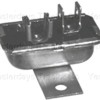
I was thinking she was running hot, and I had her out today and sure enough her temp needle went clear over to 110. My shpinter tightened like it always does when that happens and we head for home. I turn on the heater cause that always helps and cool air is coming out. But the temp drops, so it must have worked right? Well on the way home I hit the dome light switch instead of the heater switch, by mistake, and guess what, the temp went down!

WTF??? I turned it off and the temp went back up. DOH!! The bitch has been lieng to me!! All these years of...
Detom: "C'mon baby, let's get it on!"
Pantera: "Not tonight honey, I am a little too hot."
Yeah, she is a schemeing lazy old bitch, and if I didn't lover her so much I would leave her flat.
DAMN!!!



